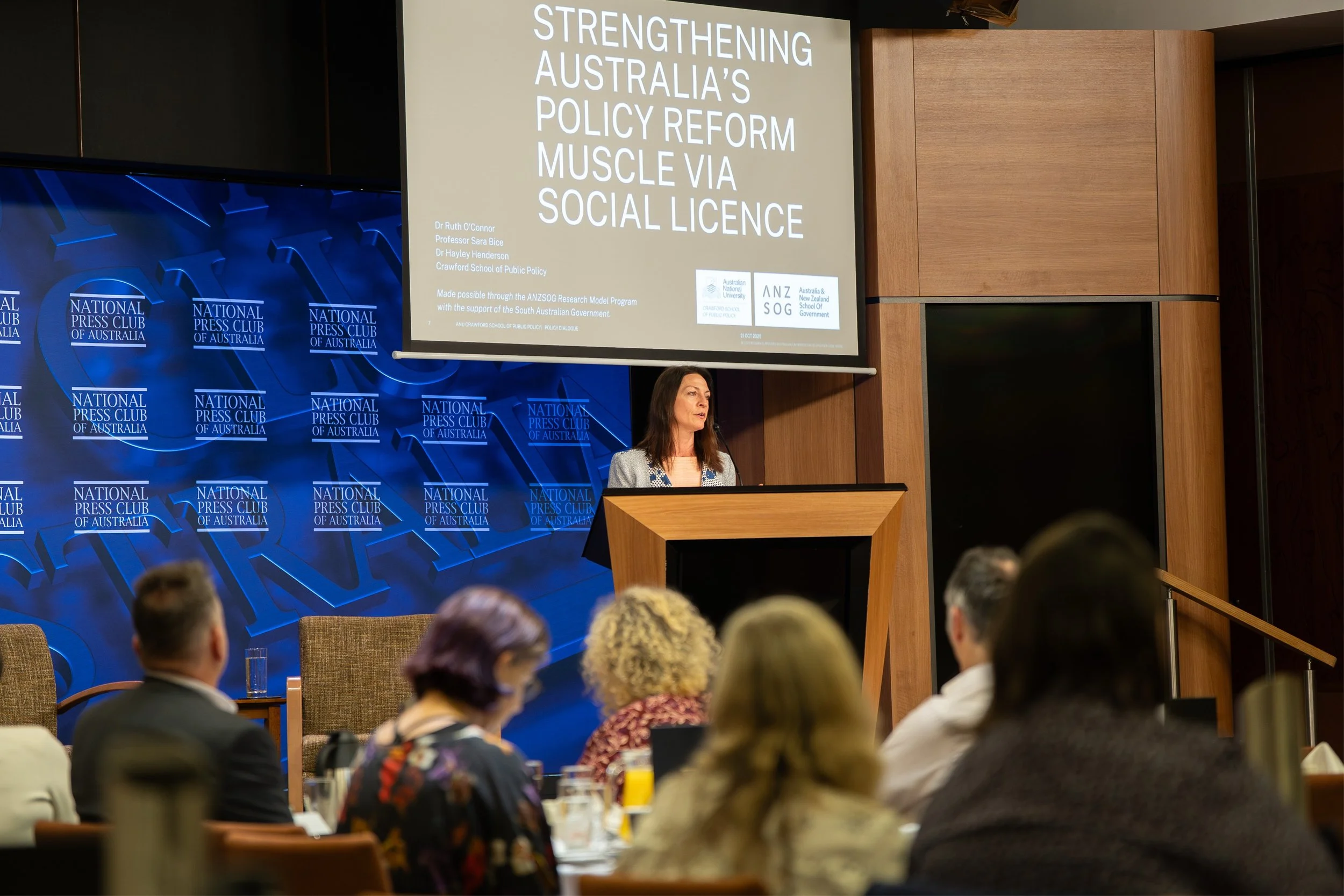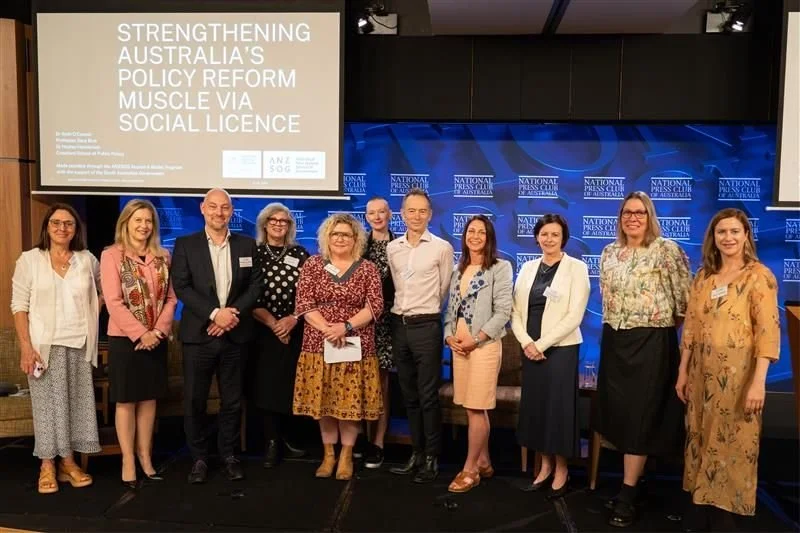Strengthening Australia’s reform 'muscle' via Social Licence to Operate: Evidence and practice
In Australia, progress on complex reform has been limited in recent years - hampered by, among other things, competing evidence claims and resourcing allocations.
This post highlights the findings of a new project on Social Licence to Operate (SLO) as a set of policy practices that can support major reform. The project was co-designed and funded with ANZSOG and the South Australian Department of Premier and Cabinet, and conducted by Ruth O’Connor, Sara Bice, and Hayley Henderson at ANU’s Crawford School of Public Policy.
The project draws on a series of commissioned case studies, which feature Power to Persuade team members Sophie Yates and Sue Olney discussing current NDIS reforms.
The project
Governments worldwide face urgent, complex challenges, from entrenched disadvantage and climate change to geopolitical instability and AI. Yet, Australia’s recent track record on major policy reform has been vexed by concerns about the public sector’s capacity to respond effectively.
This can stem partly from risk aversion within the public service, driven by fears of public backlash, reform fatigue, or lack of buy-in. Australia’s federal system adds complexity, with unclear responsibilities across multiple jurisdictions and actors, making alignment difficult. This can weaken public trust and negatively impact confidence and effectiveness in government.
Major reform typically requires system-wide collaboration, with governments convening resources, expertise, and stakeholders around shared goals and finding the best solutions. Despite what many refer to as a hollowing out of public sector expertise, examples that lay out practices, processes and structures for reform can help to build confidence and identify the ‘reform muscle’ needed for contemporary policymaking.
A recent research project focused on Social Licence to Operate (SLO) as a set of policy practices that can support major reform. The project was co-designed and funded with ANZSOG and the South Australian Department of Premier and Cabinet, and led by Professor Sara Bice at ANU’s Crawford School.
SLO refers to the ongoing acceptance of a policy or initiative by stakeholders and communities, built on trust, legitimacy, and procedural fairness. While SLO is well-established in industries like mining, its application in policymaking is still emerging. The project examined how SLO is understood in the public sector, whether its principles are transferable, and what capabilities are needed to build and sustain it.
Who is this research for?
This research aims to inform public sector leaders, policymakers, and senior advisors seeking to drive major reforms with stronger public support. It will also interest government agencies, think tanks, and academics focused on governance and public trust. Community groups and advocacy organisations will be able use the findings to better engage with policy processes, while political leaders may draw on the insights to build legitimacy and navigate complex reform agendas.
Professor Sara Bice launching the project report at the National Press Club in October 2025
The research team, practitioner panellists and case study authors at the project launch
Approach
The research started with a review of academic and government literature to identify the conditions, capacities, and practices, such as strategic planning and engagement strategies, that help governments earn and maintain social license for reform.
The research team then developed in-depth case studies of successful major policy reform in Australia and internationally.
The final report defines SLO in the context of major policy reform, provides case studies and key lessons, and outlines key guidance for system-level innovation to build and maintain the muscle for major policy reform.
With its focus on understanding the forces shaping SLO and reform muscle across diverse case studies and policy contexts, the project provides valuable cross-jurisdictional lessons and actionable insights for the public service to address the complex challenges of the 21st century.
The cases
The case studies were selected to explore how reform works in different contexts, including diverse policy areas, varying levels of complexity, and examples of multi-level and cross-agency and cross-jurisdictional coordination. They included how local governments navigated the polarised debate over January 26 (Australia Day) celebrations, montetary policy implementation, and decarbonisation of the electricity system.
Power to Persuade team members Sophie Yates and Sue Olney contributed a case considering current National Disability Insurance Scheme reforms through the lens of social licence to operate. The case explores how the Federal Government has multiple publics and many competing interests to satisfy in reforming the NDIS. Ultimately, the future of the scheme hinges not only on demonstrating its value to those with a direct stake, but also to taxpayers funding it. Achieving balance between the priorities of service users and the priorities of taxpayers calls for both an economic and a human rights lens in measuring and explaining impact. The case demonstrates the importance of public acceptance necessary to long-term, large-scale policy reform, closely linked to public satisfaction with reform processes and results, and trust in government and related service providers to deliver.
The NDIS case can be found here (p. 59-70) along with the six other cases informing the larger project.
Overall takeaway
The project report underscores that successful policy reform in Australia hinges not just on technical design or political mandates, but on the ability of governments to build and sustain a social licence to operate - a multidimensional concept encompassing trust, legitimacy, and credibility. The authors show that reforms often require multiple licences across different communities and stakeholders, and that acceptance alone is insufficient without genuine engagement, transparency, and responsiveness. Participatory processes, boundary-spanning partnerships, and communication strategies are essential tools, but only when they are used meaningfully and consistently.
The overarching takeaway is that Australia’s public sector must strengthen its reform muscle by investing in the capabilities needed to build social licence. This includes developing skilled, community-facing public servants, preparing for crises with evidence-based options, and proactively managing disinformation. Reform success is not just about policy content, it’s about process, relationships, and trust. Governments must move beyond transactional engagement to build enduring legitimacy, especially in a context of declining political trust and increasing complexity. The report offers a practical framework and checklist to guide reform leaders in navigating these challenges.
Post moderated by Sophie Yates


